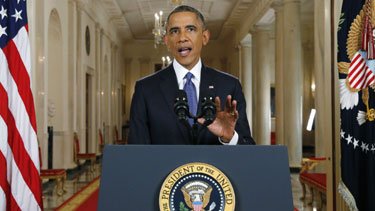Obama Divides Rather Than Leads… Again
Barack Obama, Dirty Politics, Illegal Immigration
Barack Obama piously quoted Scripture and posed as a great idealist going out on a limb to do the right thing for poor Hispanic immigrants but, in reality, he was playing ruthless partisan politics, setting aside due process and overreaching his own authority in order to set a trap for Republicans and permanently lock in the Hispanic vote for democrats.
Something needs to be done to bring American immigration policy into line with America’s economic needs, and something needs to be done to regularize the status of people living here and doing most of the country’s worst-paying and most disagreeable jobs, but before that can be done, we need to win the national debate and properly form a consensus.
What Barack Obama just did was the precise opposite of building a consensus. He divided the country further and inflamed passions over an issue on which the country is not thinking rationally and in which we were already excessively divided. And he did it cynically for political gain.
Peter Suderman makes the same point at Reason:
[U]nilateral executive action could poison support for broader, more stable reform. There’s no question that the immediate political consequence would be to further outrage Republicans, and turn a party that has long had a mix of views about the virtues of expanding immigration into one dominated by opposition. In fact, this seems to be part of what the administration wants—to provoke Republicans into a frothing rage, in hopes that they will do something politically stupid as a result. (They might oblige.)
But the backlash might not just be the immediate consequence, and it might not just be limited to the congressional GOP and its core supporters; unilateral action might result in a deepened long-term opposition to greater immigration as well.
One only need to look at the political dynamic in the years since the passage of Obamacare, another ambitious policy passed with no opposition party support and a wary public. Democrats hoped it would provide a path to political victory, but the actual result was a deep and enduring public opposition that has cost Democrats in multiple elections.
Similar to Obamacare, about 48 percent of the public disapproves of Obama’s proposed action, while just 38 percent say they support the move. And similar to Obamacare, the president’s actions are making some Democrats nervous too. And just as before, supporters are arguing that opposition will blow over quickly.
I wouldn’t bet on it. Unprecedented, unpopular, large-scale, unilateral policy changes are nearly certain to produce a backlash—against the president, against his party, and against the ideas at the heart of the policy change itself.
To me, this is the most significant risk of Obama’s plan—that it will create a backlash, not only amongst congressional Republicans, but within the public at large, a backlash that makes it more difficult to achieve a stable, legal, and politically viable system of expanded and simplified immigration, one that is not dependent on a sympathetic executive or enforcement discretion, but that is codified in law and agreed upon by enough of the country’s residents and legislators.
This is not to simply condemn Obama’s plan, but instead to warn enthusiastic supporters that the choice to act at this time, in this way, without legislative backing or public support, might be satisfying in the moment, but also stands a real chance of closing off opportunities for a better, more lasting solution at some point in the future. Consensus is hard, and sometimes it seems impossible, but in politics, it’s also important.





